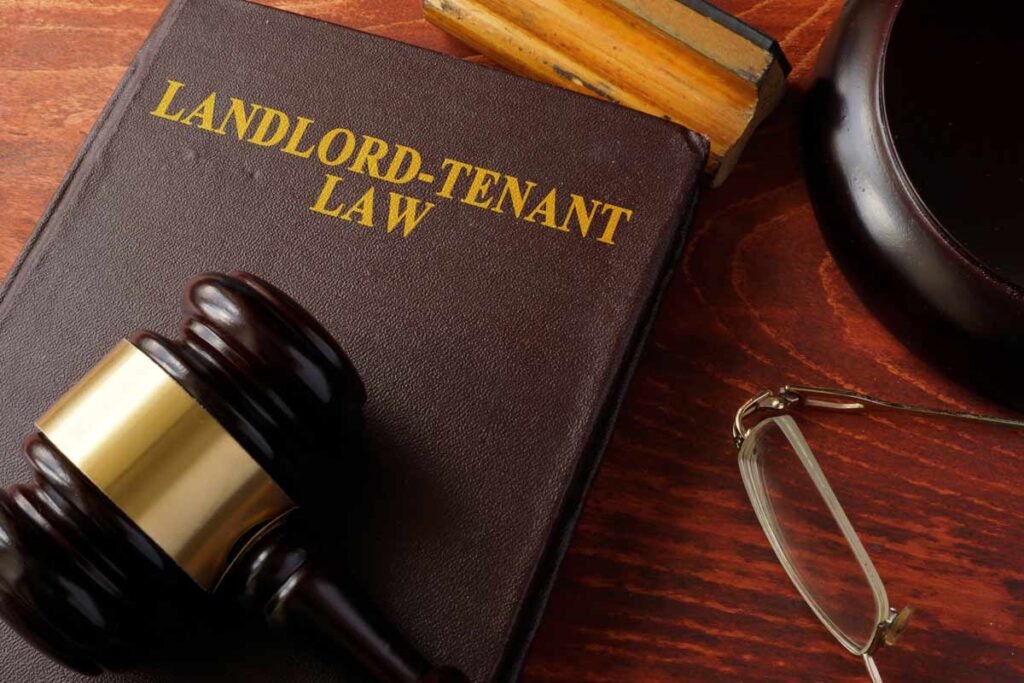PLEASE NOTE: We are not attorneys, this is not legal advice, and these laws changes. I encourage everyone to contact an attorney in the event of specific questions related to their situation.
Just Cause Eviction is a recent restriction passed into law by the California State Legislature that limits a landlord’s ability to terminate a lease for a tenant once that tenant has occupied the property for longer than 12 months throughout California. This is separate from the California eviction moratorium extension for COVID; this is a permanent legal change.
California can be a hard place to own property and it has gotten harder over the years, especially with everyone dealing with COVID.
But just what is the new eviction law in California? How will AB 1482, the just cause eviction law, affect you and your property rental? Let’s go over California’s new eviction laws to explain what it does and what you should be doing to meet your obligations to your tenants under the law.
Read below for a memo our attorney drafted for our clients at the onset of the new Just Cause’ Eviction ordinance, that gives you a birds’-eye view of the new rules, stipulations and caveats to be aware of. Hopefully it helps you clarify what you need to do for your rental property.
For Landlords:

As you may be aware, California passed AB 1482, known as the Tenant Protection Act of 2019. This law established statewide rent control for applicable rental properties. If you own rental property in a city where there are more stringent rent control laws already in place (e.g., San Francisco, Oakland, Berkeley, East Palo Alto, Hayward, San Jose, Santa Monica, West Hollywood, Los Angeles, Palm Springs), then the local laws would control over the state laws. For any cities that did not previously have rent control laws, this new state law would apply to your city assuming your property is not exempted (see further discussion below). We have asked our legal team to create this summary of the new law so you can understand your obligations as a landlord moving forward.
The law caps the amount the landlord can charge for rent increases each year and requires “just cause” for termination of the lease for tenants who occupy a property for more than 12 months.
Rent Increase Cap: The rent increase for all leases is capped at 5% plus the change in cost of living, or 10%, whichever is lower. The CPI obviously differs by county, so you will need to consult the CPI for your area to determine the change in cost of living from April of the prior year to April of the current year. For example, in San Diego County, the CPI increase from last year is 4.1%, so the most you could currently increase the rent in San Diego County would be 9.1%.
You can find detailed information on rent increase in our article How to Raise Rent in California?
Just Cause for Termination: The following are the only permitted “just cause” reasons for termination of the lease where the tenant has resided in the unit for 12 months or more (*note this does not apply to exempt properties if notice has been provided to the tenant):
At-fault Just Cause: A landlord must serve the tenant with a 3-day written notice to cure for any of the “at fault” reasons below that are curable breaches before evicting.
- Default in payment of rent
- Breach of material term of the lease after notice to cure is served
- Maintaining, committing or permitting a nuisance
- Committing waste
- Tenant’s lease terminated on or after January 1, 2020 and, after written request from the landlord, the tenant fails to execute a written extension or renewal of the lease for an additional term of similar duration on similar provisions
- Criminal activity
- Assigning or subletting in violation of the lease terms
- Tenant’s refusal to allow the landlord to enter the premises after being given notice to enter due to health/safety issues
- Use of the premises for an unlawful purpose
- Employee, agent, or licensee’s failure to vacate after termination as an employee, agent or licensee
- Tenant’s failure to vacate and surrender possession after giving the landlord written notice of tenant’s intention to terminate the tenancy
No-Fault Just Cause: Requires the owner to provide the tenant with a relocation assistance payment (equal to one month’s rent) OR agree to waive the final month’s rent. The landlord must give the tenant notice of the tenant’s right to relocation assistance or rent waiver in writing. Failure to comply with this renders the termination notice void.
- Owner, spouse, domestic partner, children, parents, grandparents, grandchildren who intend to occupy the property as their primary residence provided the tenant agrees in writing, or the lease includes a provision allowing the owner to terminate to take back the property to reside in;
- Withdrawal of the property from the rental market;
- Owner has to comply with an order issued by a government agency or local ordinance requiring the tenant to vacate (*Note if the tenant caused the problem necessitating the termination, tenant shall not be entitled to relocation payments)
- Intent to demolish or substantially remodel the unit (i.e., structural, electrical, plumbing, mechanical modifications that require a permit, or abatement of hazardous materials, which require the tenant to vacate for at least 30 days. This does NOT include cosmetic repairs)
Just Cause Exempted Properties: The following properties are exempted from the just cause requirements:
- Transient and tourist hotel occupancy (i.e., Short term rentals for less than 30 days)
- Dormitories (i.e., colleges, or grade 1-12)
- Housing subject to rent or price control through a public entity restriction
- Housing where a tenant shares a bathroom or kitchen facilities with the owner who lives in the property
- Housing that has been issued a certificate of occupancy in the last 15 years (*Note this date is revolving)
- Single family owner-occupied residences where the owner rents no more than two bedrooms, including accessory dwelling units
- Duplex where the owner occupied one of the units during the beginning of the tenancy and remains in occupancy
- Single family homes, townhomes, and condominiums owned by individuals, family trusts, or limited liability companies so long as the LLC does not have any corporate members. (*Note single family homes and condos owned by a corporation, real estate investment trust, or corporate member LLC are subject to the rent control law)
Rent Control Exempted Properties (Civil Code 1947.2): The following properties are exempt from the Rent Control law requirements:
- Low-income housing
- Dormitories
- Housing subject to a local rent control ordinance
- Housing that has been issued a certificate of occupancy within the previous 15 years.
- Single family homes, townhomes, and condominiums owned by individuals, family trusts, or limited liability companies so long as the LLC does not have any corporate members. (*Note: single family homes and condos owned by a corporation, real estate investment trust, or corporate member LLC are subject to the rent control law)
If your property qualifies as an SFR, townhome or condo, for all new leases entered into after July 1, 2020, the exemption language MUST be included in the lease or addendum for the property to be qualified as exempt:
“This property is not subject to the rent limits imposed by Section 1947.12 of the Civil Code and is not subject to the just cause requirements of Section 1946.2 of the Civil Code. This property meets the requirements of Sections 1947.12 (d)(5) and 1946.2 (e)(8) of the Civil Code and the owner is not any of the following: (1) a real estate investment trust, as defined by Section 856 of the Internal Revenue Code; (2) a corporation; or (3) a limited liability company in which at least one member is a corporation.”
So, to summarize the above briefly, make sure you look through this and consider it as you go forward. If you own a non-exempt property, even at the expiration of the lease, you may not be able to serve the tenant notice, or at minimum enforce them vacating the property.
If you would like to speak more deeply about this and other items related to property management, never hesitate to contact us.





